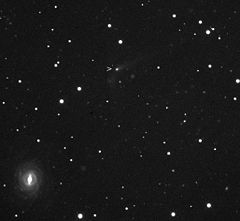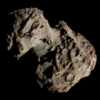74P/Smirnova–Chernykh
Appearance
 | |
| Discovery | |
|---|---|
| Discovered by | Tamara Mikhailovna Smirnova Nikolai Stepanovich Chernykh |
| Discovery date | March 4, 1975 |
| Designations | |
| 1967 XV; 1975 VII; 1984 V; 1992 XXI | |
| Orbital characteristics | |
| Epoch | May 1, 2009 |
| Aphelion | 4.790 AU |
| Perihelion | 3.557 AU |
| Semi-major axis | 4.173 AU |
| Eccentricity | 0.1485 |
| Orbital period | 8.53 yr |
| Inclination | 6.647° |
| Last perihelion | January 26, 2018[1] July 30, 2009[2] |
| Next perihelion | 2034-Jun-14[3] |
74P/Smirnova–Chernykh is a periodic comet in the Solar System. It fits the definition of an Encke-type comet with (TJupiter > 3; a < aJupiter),[4] and is a Quasi-Hilda comet.[5] It was discovered in late March 1975 by Tamara Mikhajlovna Smirnova while examining exposures from the Crimean Astrophysical Observatory.[6] In the discovery images the comet had an apparent magnitude of ~15.[6] In the year of discovery, the comet came to perihelion on August 6, 1975.[6]
The comet had been photographed during 1967, but was identified as an asteroid and assigned the designation 1967 EU.[2]
The comet is estimated at 4.46 km in diameter, and currently has an orbit contained completely inside of the orbit of Jupiter.[4]
References
[edit]- ^ Syuichi Nakano (2007-07-09). "74P/Smirnova-Chernykh (NK 1485)". OAA Computing and Minor Planet Sections. Retrieved 2010-02-24.
- ^ a b Seiichi Yoshida (2005-08-28). "74P/Smirnova-Chernykh". Seiichi Yoshida's Comet Catalog. Retrieved 2010-01-25.
- ^ MPC
- ^ a b "JPL Small-Body Database Browser: 74P/Smirnova-Chernykh". Jet Propulsion Laboratory. Retrieved 2010-01-25.
2009-12-30 last obs
- ^ Toth, I. (March 2006). "The quasi-Hilda subgroup of ecliptic comets - an update". Astronomy and Astrophysics. 448 (3): 1191–1196. Bibcode:2006A&A...448.1191T. doi:10.1051/0004-6361:20053492.
- ^ a b c Kronk, Gary W. "74P/Smirnova-Chernykh". Retrieved 2010-01-25. (Cometography Home Page)
External links
[edit]- Orbital simulation from JPL (Java) / Horizons Ephemeris
- 74P at Kazuo Kinoshita's Comets
- Images of 74P/Smirnova–Chernykh from the 2009 passage


